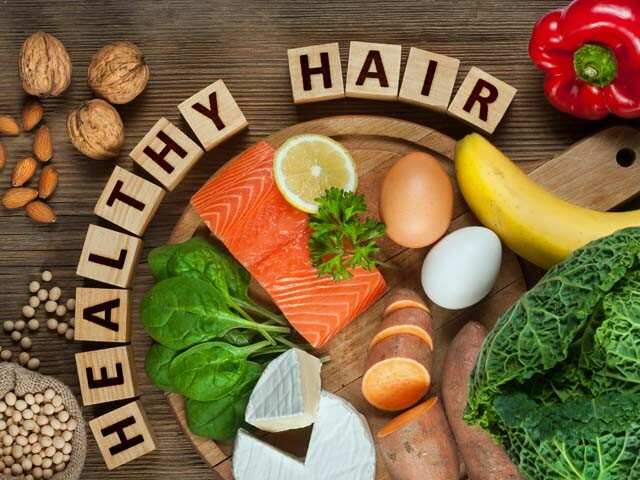8 Follow a sensible diet for healthy hair
8 Follow a sensible diet for healthy hair

Hair health also has to do with what’s under the scalp,
since it eventually reflects on what’s above!
The ‘live’ part of the hair is housed in the follicle, and just like the other organs,
derives nutrition from food and the bloodstream.
So if you find yourself nutrient-deficient, you’ll find your hair instantly looking lackluster, dull, and thin.
Protein is the building block of healthy hair since it holds each strand together!
Protein is the building block of healthy hair since it holds each strand together!
The hair itself is made up of a protein called keratin, and yours tends to be stripped of it with everyday styling, pollution, and stress.
Increase the protein levels in your diet by consuming a diet rich in dairy – cottage cheese, other unprocessed cheeses, ghee, yogurt
– as well as eggs, poultry, legumes, lentils, green beans, and limited amounts of soy.
Omega 3 fatty acids are also essential to keep your scalp and hair follicles from drying out,
Omega 3 fatty acids are also essential to keep your scalp and hair follicles from drying out,
reduce inflammation (which is a major cause of hair shedding), and promote hair growth.
Male pattern balding and hair loss in women is often associated with insulin resistance, which in turn is a byproduct of Omega 3 deficiencies.
Try salmon, mackerel, and sardines.
Vegetarians, you can get your daily dose of Omega 3 from avocados, flaxseeds, olive oil,
and walnuts.
Eat vitamins as well – particularly generous helpings of fresh fruits and vegetables.
Zinc is vital to balancing your hormones and for RNA and DNA production,
Zinc is vital to balancing your hormones and for RNA and DNA production,
which in turn affects hair texture and thickness. Oysters are an amazing source of zinc, as are shrimps, mussels, beef, and fortified cereals like oatmeal, beans, and eggs.
Selenium is a trace element that protects the scalp’s tissues from oxidation.
Selenium is found in mushrooms, sunflower seeds, brazil nuts, brown rice, whole-grain rye, and crabs.
The body also needs at least 18 mg of iron a day to ensure healthy hair growth and strength,
The body also needs at least 18 mg of iron a day to ensure healthy hair growth and strength,
so eat your greens!
Silica is important for the absorption of the vitamins you consume.
So even if you’re eating up a lot of healthy food, but not getting your daily requirement of silica,
it’s a bit lesser effective.
Silica-rich foods include bean sprouts,
cucumbers, and red bell peppers.
Tip:
Tip:
Eat a diet rich in omega-3 fatty acids, vitamins, protein, iron, silica, and fluids to hydrate.
![★彡[ʀᴀʀᴇ ʙᴇᴀᴜᴛʏ ʙʟᴜꜱʜ]彡★](https://blogger.googleusercontent.com/img/a/AVvXsEg3sPfakqI5y59U2taEkPyrMLVQmb0bR3EuzAKSNlDl8pIaCKZuFQ0HnCoUOBeYf67E5t_rClQFUNCvcCFokmJsaU0zYfUmXWAThNqr7GZWwrg72tL6KvuDfk3fwF_HStJsZSmxX_tOOxnpgsu3bWt6URmIRPp5FKkfI0qBngSjG4fO8kuCRt5yBMf_=s370)

v nice
ReplyDelete